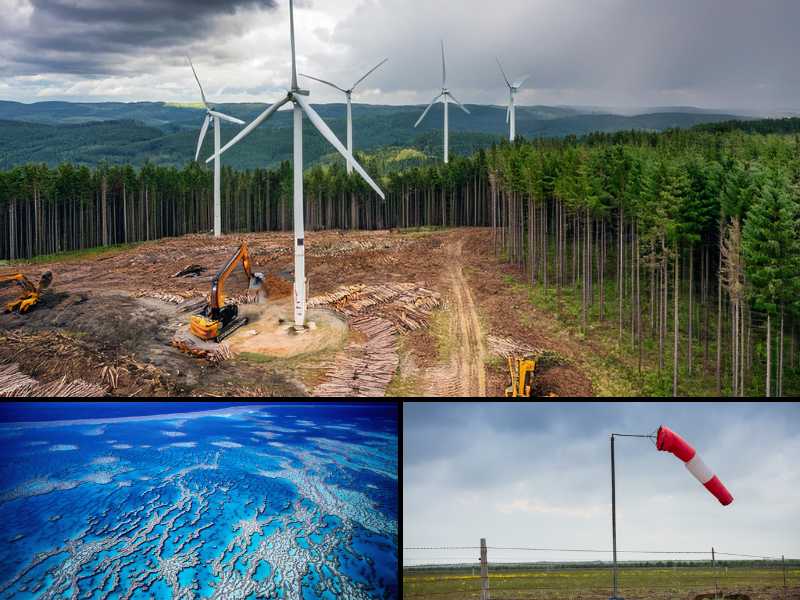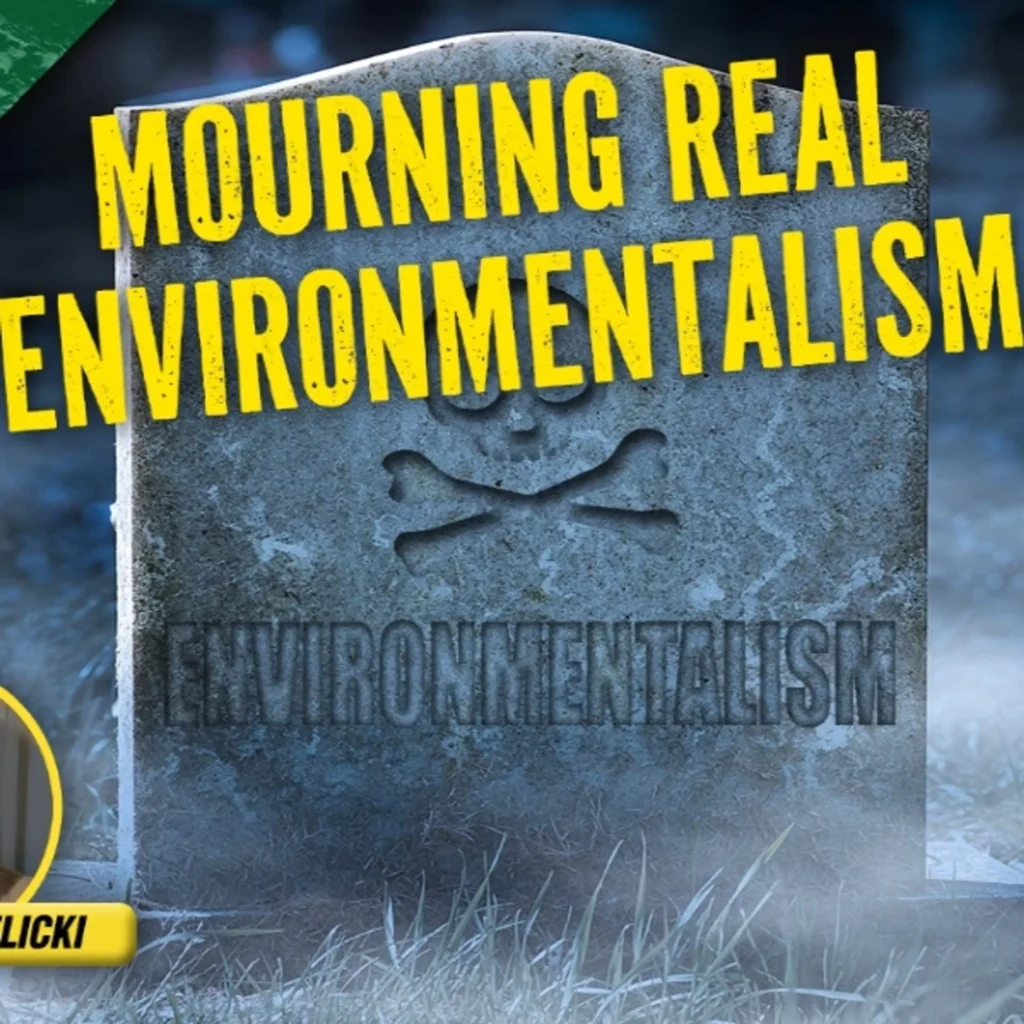In the 1970s and 1980s, energy policy debates in the U.S. were mostly over the regulation of oil and natural gas prices and allocation. Energy shortages and price spikes led many to adopt an “energy-is-bad, energy conservation is good” position.
In the early 1990s, the energy policy debate shifted to energy “sustainability.” Depletion, pollution, reliability (security), and anthropogenic (man-made) climate change are the four sustainability issues. The last, climate change, is by far the most important of the four for the future of carbon-based energies.
Where does the energy sustainability debate stand as of mid-2003? The intellectual momentum has shifted to the optimists who see environmental progress as the norm and who believe that the market’s improvement process will effectively solve new problems along the way.
What has changed to mute energy alarmism? Six trends have been especially important.
(1) Eco-Energy Planners No Longer in Power
First, the end of the Clinton/Gore era has taken the eco-energy planners out of the seat of power and put them on the sidelines where few outside of their choir are listening. Gone is the Gore-led President’s Council on Sustainable Development, which marginalized the opposition–the sound science, realism-based, free-market environmentalists. Instead, Bush and Cheney released their National Energy Policy: Report of the National Energy Policy Development Group (May 2001), which set a pro-development tone for the “official” debate. High oil and gas prices since then have also added momentum to the cause of resource and infrastructure development over conservationism.
Where did the leaders of eco-energy interventionism go? Tapping into a huge reservoir of funding from such left-of-center foundations as Rockefeller, Turner, MacArthur, Packard, and Pew, they are scattered around at different “green” groups. In particular, they are administering and advising two energy groups in their political exile:
- The Energy Future Coalition (http://www.energyfuturecoalition.org). Its White Paper on a new energy future concludes, “We aim at ambitious but achievable goals: cutting U.S. oil consumption and carbon emissions by a third from current levels over the next 25 years, and sharply increasing access to modern energy services in the developing world.”
This CO2 reduction target is more draconian than the Bush-rejected U.S. obligation under the Kyoto Protocol of 7 percent below 1990 levels. It is drastically below the “business as usual” forecast from the U.S. Energy Information Administration (EIA)–a 42 percent increase (1.5 percent per year) in CO2 emissions from 2000 to 2025. Oil usage, meanwhile, is forecast by the EIA to grow 1.6 percent per year, or 47 percent in the same 25 years.
This indeed would be a new energy future–and one that would require extensive government planning and re-direction of today’s consumer-driven energy sector. Energy rationing would be a likely result.
- The National Commission on Energy Policy (http://www.energycommission.org/about/). Co-chaired by Harvard environmentalist John Holdren, it will release its study in late 2004 or early 2005. Expect no surprises. There will be alarms about carbon dioxide emissions with recommendation of a plethora of activist policies to forcefully redirect energy sources away from carbon fuels and reduce total energy usage.
Consumers are not buying into energy alarmism from these energy scare groups. The public wants affordable, reliable, plentiful energy today and tomorrow. No amount of private foundation money will change this–so long as the climate and energy realists document the facts and present them in terms of common-sense free-market principles to the public, industry, and other groups.
(2) Doomsayers Have Been Exposed
A new voice, Björn Lomborg, has exposed the shaky intellectual foundations of doom-and-gloom environmentalism in a way that has captured international media interest. Julian Simon could not do this in his lifetime, but Lomborg–who originally set out to refute Simon but ended up agreeing with him after intensive investigation with a working group–has done so!
The Lomborg phenomenon began with his book, The Skeptical Environmentalist: Measuring the True State of the World (Cambridge University Press, 2001), which received favorable publicity in such quarters as the New York Times and Washington Post as well as other publications around the world. The doomsayers ignored the book at first (their strategy is to assert, not debate) but suddenly found themselves losing out by their silence.
A spate of vitriolic attacks on Lomborg followed, despite his affable, scholarly demeanor and politically correct credentials as a former member of Greenpeace, vegetarian, and openly gay.
The media’s reaction to Lomborg has forced his critics to come to the intellectual table to refute him with facts and theory. Cracks of dissent have opened among the liberal environmentalists’ ranks. A well-known European climate alarmist, Michael Grubb, wrote in a book review for Science magazine, “To any modern professional, it is no news at all that the 1972 Limits to Growth study was mostly wrong or that Paul Ehrlich and Lester Brown have perennially exaggerated the problems of food supply.”
Contrary to Grubb’s assertion, it is big news that an environmental alarmist should acknowledge the flaws in work published by Ehrlich and Brown, two of the most revered names in the environmentalist movement.
In the face of that statement, what do Lomborg’s critics do–attack Grubb, stay silent and lick their wounds, or prominently announce, as Laurel did to Hardy, “I’m better now”? They stayed silent. Still, the monolithic front of intellectual environmentalism is under severe pressure thanks to Lomborg.
(3) Heightened Concern over Third-World Poverty
Poverty from a lack of modern energy and clean water has been elevated to a major international sustainability problem, reducing the urgency of addressing perceived long-run problems such as man-made climate change. Real development, not “sustainable development” as defined by western environmentalist groups, gained the upper hand at the United Nations’ World Summit on Sustainable Development held in Johannesburg last year. And it has continued this way, thanks in part to the influence of Lomborg.
Development as a competing environmental paradigm is the major theme of a new book by Jack Hollander. The Real Environmental Crisis: Why Poverty, Not Affluence, Is the Environment’s Number One Enemy, takes false alarmism to task and urges that the environment can best be improved by focusing on real, here-and-now problems like poverty in the Third World. Hollander is professor emeritus of energy and resources at the University of California at Berkeley, a bastion of energy and climate alarmism. His book is another signal that major changes are afoot.
Science, the flagship publication of the American Association for the Advancement of Science, whose members compose the environmental science community, is prone to views expressing energy and climate alarmism. Yet a December 6, 2002 editorial, titled “In Praise of Petroleum?” asked an obvious question:
Does it make sense to ask the poor to take on novel devices and fuels that have never been tried elsewhere? … Rather than excluding petroleum, some of this one-time gift from nature ought actually to be reserved to help fulfill our obligation to bring the health and welfare of all people to a reasonable level: an essential goal of sustainable development, no matter how defined.
(4) Even Alarmists Are Facing Reality
Climate and energy realities are breaking through in mainstream analysis, further cracking the anti-carbon environmentalist cartel. A major study published in Science by 18 authors, “Advanced Technology Paths to Global Climate Stability: Energy for a Greenhouse Planet,” forthrightly concluded that the technology does not exist to shift from carbon energies to low-carbon ones. The mass quantities are not available, and what supply there could be cannot be produced at an acceptable cost to society.
“Revolutionary changes in the technology of energy production, distribution, storage, and conversion” are required, changes that “cannot be simply regulated” into being. This view, authored within the energy-alarmist community, contradicts the mantra of environmental groups that are urging more and more short-term regulation and subsidies for renewable energy and energy conservation to address what they see as the carbon problem.
The same study takes the wind out of the Kyoto Protocol:
Paradoxically, Kyoto is too weak and too strong: Too strong because its initial cuts are perceived as an economic burden by some (the United States withdrew for this stated reason); too weak because much greater emission reductions will be needed and we lack the technology to make them.
(5) Side Effects of Renewables Split the Environmental Movement
Discontent with politically correct renewable energies, particularly wind power, is beginning to set in among anti-development environmentalists. A June 5 New York Times article, for example, reported proposed U.S. wind farm projects have created “huge turbulence with the environmental movement.” The article continued,
The growing [wind] industry has caused a kind of identity crisis among people who think of themselves as pro-environment, forcing them to choose between the promise of clean, endlessly renewable energy and the perils of imposing giant man-made structures on nature.
A highly publicized debate over a proposed 420 megawatt project off the coast of southern New England (powered by GE turbines that stand 100 meters tall on land and up to 75 meters when offshore) has pitted local environmentalists against their national brethren. Asks one writer for Renewable Energy World: “Will the real environmentalist please stand up?”
(6) Seeking Relevance in the Center
The sixth, and by no means least important, trend causing the country’s movement away from energy alarmism is the intellectual left’s overall shift toward the center, in a quest for policy relevance.
Consider the transition being made by John Holdren, holder of the Teresa and John Heinz professorship in environmental policy at Harvard University. In the 1970s Holdren, along with Paul and Anne Ehrlich, wrote:
A massive campaign must be launched to restore a high-quality environment in North America and to de-develop the United States. … Resources and energy must be diverted from frivolous and wasteful uses in overdeveloped countries to filling the genuine needs of underdeveloped countries. This effort must be largely political.
Such a view if stated today would rupture Holdren’s standing as a collaborator in the energy policy debate. Instead Holdren opens his 2000 “Memorandum to the President” with this statement: “A reliable and affordable supply of energy is absolutely critical to maintaining and expanding economic prosperity where such prosperity already exists and to creating it where it does not.”
This sea change gives moral sanction to energy as an improving consumer product, not just a political product in the quest for “sustainability.” Such pragmatism is by no means limited to Holdren. Al Gore contradicted the energy policy outlines of his book, Earth in the Balance, when he stated on the campaign trail for the U.S. Presidency in 2000:
I think we need to bring gasoline prices down. . . . I have made it clear in this campaign that I am not calling for any tax increase on gasoline, on oil, on natural gas, or anything else. I am calling for tax cuts to stimulate the production of new sources of domestic energy and new technologies to improve efficiency.
More Work to Do
This is not to say that the battle between anti-growth alarmists and free-market realists is about to be won with direct political ramifications. There are a number of negative trends that require the best efforts of the climate and energy realists to turn the great climate and carbon alarm into just a shrill noise that gets lost in the night. But it does suggest that energy realists are winning in ways that have not occurred before.
What work remains to be done? Energy alarmism is being used as a tool to try to portray Republicans and President Bush as anti-environment. Yet carbon dioxide constraints on energy are anti-consumer, particularly to lower-income consumers. The premier energy-environmental think tank, Resources for the Future (RFF), speaks with one voice for regulating carbon dioxide despite a solid intellectual case for keeping the lid closed on this Pandora’s Box. RFF should stop speaking with one voice on such a two-sided issue or be held accountable when regulation begins and the highly predictable negative consequences follow.
By engaging in climate alarmism, European-based major oil companies have given false sanction to the intellectual and political left and opened themselves to charges of “greenwashing” given their massive, growing hydrocarbon operations. Meanwhile, their paltry investments in wind and solar are proving to be financially underperforming.
Finally, the Bush administration is proving too timid to officially reject government-sponsored programs for voluntary greenhouse gas reductions–programs that are likely to create the institutions and incentives to result in mandatory programs later on. Being “a little pregnant” is not a strategy that can last.
Overall, the debate over energy and climate alarmism is winnable for the proponents of energy and climate realism. Even in a worst-case situation where the U.S. adopts carbon dioxide (CO2) regulation, the program(s) will be so messy and watered down that virtually everyone will be left unsatisfied. There will be higher energy prices and gross inefficiencies reminiscent of earlier abandoned regulatory schemes. There will be a pound of corporate welfare for every ounce of real emission reductions, giving corporate critics on the Left plenty to lament.
More urgent environmental priorities will be left with fewer resources. In short, virtually everybody will be worse off except for a small intellectual elite. Proponents of energy policy activism must ask themselves: Is this worth fighting for?
Robert Bradley is president of the Institute for Energy Research in Houston and an adjunct scholar of the Cato Institute. He received the Julian Simon Memorial Award for 2002 and is author, most recently, of Climate Alarmism Reconsidered, published by the Institute of Economic Affairs in London.
For more information …
Robert Bradley’s Climate Alarmism Reconsidered is available for purchase for $5.00 from The Heartland Institute. Order from The Heartland Institute’s online store at http://www.heartland.org.



